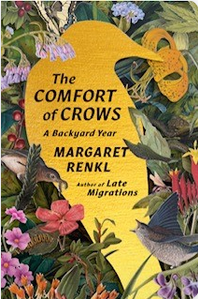More on this book
Community
Kindle Notes & Highlights
Too often I feel I am living in a country I no longer recognize, a country determined to imperil every principle I hold dear and many of the people I love, too. Immersing myself in the natural world of my own backyard—or the nearby parks and greenways, or the woods surrounding our friends’ cabin on the Cumberland Plateau—is the way I cope with whatever I think I cannot bear. I’m not trying to hide from the truth but to balance it, to remind myself that there are other truths, too.
“Birdy, birdy, birdy, birdy, cheer, cheer, cheer.” My heart sings, too. I can’t help myself. Beauty and light will always be their own reward.
it remains stickywilly to me all these years later in Tennessee. What you call the wildflowers will tell you who you are.
The microbes in freshly turned soil stimulate serotonin production, working on the human brain the same way antidepressants do. Here
The earthworms beneath the soil haven’t the least idea of the frets that pluck at my heart. In their rest, I find rest.
The flowering trees—dogwoods and redbuds and serviceberries, crab apples and peaches and cherries—are in full splendor now, and every time it rains, the streets are paved with petals.
Exquisite flowers, most of them smaller than my pinkie fingernail, bloom all around my house in April, and they have wonderful names: woodland violet, spring beauty, daisy fleabane, pitcher’s stitchwort, birdeye speedwell, yellow wood sorrel, purple deadnettle, creeping Charlie, dandelion, and many others. Something new every day. Most people call them weeds.
Precious, irreplaceable things pass away, often in a paroxysm of suffering, but life is stubborn, life is undeterred, and for every ending there are a thousand, a million beginnings.
In times of fear and grief, it is tempting to assign human meaning to natural systems. How many people have told me that a loved one has returned to reassure them in the form of a mockingbird singing at midnight outside a silent house or a swallowtail butterfly lighting on a freshly carved tombstone? When the world has lost its still center, we grasp for any reminder that it is nevertheless spinning exactly as it must.
But it was also not nothing. That night-blooming cereus brought my grandmother back to me in her halo of white hair. It brought back, too, her plum tree, long since cut down, and the feeling of red dirt between my toes. For an hour, just this once, it made me remember what it feels like when the world is exactly as it must be, and I am exactly where I belong.
Reading those verses again made me wonder: What if resting, all by itself, is the real act of holiness? What if honoring the gift of our only life in this gorgeous world means taking time every week to slow down? To sleep? To breathe? The natural world has never needed us more than it needs us now, but we can’t be of much use to it if we remain in a perpetual state of exhaustion and despair.
Before you go inside, take a leaf into your hand. Put it on your desk or next to your bed. Keep it nearby, through whatever troubles the long winter brings. It will help you remember that nothing is truly over. It will help you remember what the wind always teaches us in autumn: that just because you can’t see something doesn’t mean it isn’t there.
I listened as Ruth told me how she had learned to surrender to the wakefulness of aging. She had come to realize that fighting it was what made her so tired. If she kept still and calm, if she never paced the house or checked the clock, she sometimes dropped off again. And even when she didn’t, she rose feeling almost as rested as if she’d slept. “Maybe I need rest
December reminds us that the membrane between life and death is permeable, an endless back and forth that makes something of everything, no matter how small, no matter how transitory. To be impermanent is only one part of life. There will always be a resurrection.


